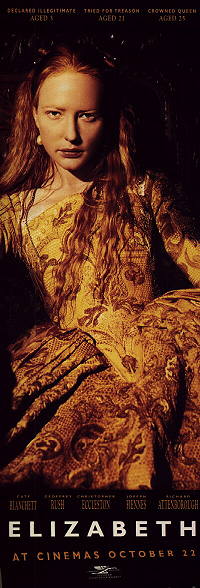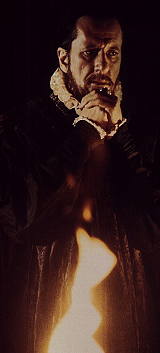

click for new |
 |
| Festivale online magazine, October issue Elizabeth movie review |
| Elizabeth Remember the historical dramas of yesteryear? A cast of thousands, magnificent sets bigger than the original buildings, rich clothing, clean people, perfect teeth, pomp and ceremony, all brightly lit and (when available) in glorious technicolor. Today's audience has been educated by A Reel Life TV and long lens snoops, avant garde music clips and hyperactive NYPD Blues camera operators to interpret shadows and suggestions. In the Nineties, jerking cameras and rapid cuts try to do the work of a cracking-good fast-paced script. Sometimes the education of the audience is to the good. In Elizabeth, the implication is that we have a more realistic interpretation of old England. Dark figures slip through the shadows, lewd and conspiratorial faces are revealed in candlelight, and the English court lives in damp, cold, cramped quarters. At any moment I expected to see rush-strewn floors and skeletal, flea-bitten dogs fighting for food scraps under the table. However everyone was clean and straight and healthy. Well, except for those whose heads were roughly saved before they were burned alive at the stake. Or those who were stabbed, piked, or poisoned during the film. |  |
|
Those in power meted out fast and rough treatment to those who opposed them or threatened their beliefs in the days before spin doctoring (see Wag the Dog).
Henry the Eighth, you remember, garnered the title Defender of the Faith from the Catholic pope for his statements against the 'heresy' of Protestantism -- only to create his own personal church when the pope cavilled at Henry's revolving marriage bed. The result of Henry's sex life was the destruction of over 90% of the religious artwork in England, and a worsened climate of fear and arrogance, cruelty and distrust. His only son, Edward, passed rapidly through the throne and eldest daughter Mary caused a brief return to power for Catholicism, forcing the Protestants to hide, recant, or leave England. |
 Geoffrey Rush in Elizabeth |
This film begins with Mary on the throne and Elizabeth (Cate Blanchett) an almost-carefree , beautiful young woman surrounded by lovely ladies-in-waiting and wooded by the moody-eyed Lord Robert (Joseph Fiennes). Carefree except for being the centre of plots to put her on the throne, or keep her from it, by fair means or foul. The opening sequences of Elizabeth are so confused that I thought Elizabeth was the crying heretic at the stake. Perhaps this was the intent of the filmmakers, but the time I spent trying to work out whether the laughing pastoral dance class was a flashback or not distracted me from the story itself. Afterwards the film settled down a bit and we were treated to an interesting interpretation of the coming to power of a monarch who founded colonial England. The contrast of the lilting music, masquerades with the dark castles and dungeons gives Elizabeth an interesting texture, and the performances are sound. Blanchett makes a bold and proud Elizabeth, especially when she treats us to her deep laughter. Geoffrey Rush as Wassingham enjoys his darkness as her life-long advisor and a sinister adversary for her enemies. More than Elizabeth herself, the subject of this film is the conspiracy and the religious anger and rivalry of the warring churches. All this yelling and screaming and killing and torture in the name of religion raises the question of what good and evil truly are. Rather than anthropomorphising the concepts into one or more gods and devils, using them to embody good and evil, we see in Elizabeth that the greatest evil is the arrogance of those who would lie and cheat and steal and conspire and murder and torment under the cover of promoting good. Conscienceless power-mongers use the human need to satisfy spiritual hunger by force feeding it organised religion -- a diet of fear and fiercesome control, of strict rules and flagrant corruption, bought and paid for by the blood and sweat of the congregation. Ultimately Elizabeth presented a theory that I had never seen in a history book or history class, and like many audience members, I guess I would like to know that the film makers were true to their material, which means that I need to believe that this is the honest and correct account of what happened, based on thorough research. You see, here's the thing with film makers. According to my script writing teacher, it is not necessary to tell the truth or be accurate if it is more exciting to lie. According to me, if you can't dramatise the truth without lying, you should sell cars instead, or used computers, or become a Washington spin doctor. So my question is: where is the bibliography for this film. Show me the proof. Otherwise, it's just a light show, pretty and entertaining, but without substance. If this isn't a true representation of Elizabethan England, then, why don't they just admit it's a fantasy and not use the names of real people?
|
| Ali Kayn
Due for Australian release: October 22, 1998 See also: Luke's review For credits and official site details, click here. Search Festivale for more |
|
|
Like us on facebook |
 |
| Just the facts:
Title: Elizabeth (1998) | ||
| The Players: Cate Blanchett, Geoffrey Rush, Joseph Fiennes, Richard Attenborough, Christopher Eccleston, Jamie Foreman,Edward Hardwick, James Frain, Emily Mortimer, Kelly MacDonald, Amanda Ryan, Kathy Burke, Terence Rigby, John Gielgud | Official website | ||
|
For session times of current films, use the cinema listings on the Movie links page. For scheduled release dates, see the coming attractions section. |
|
Like us on facebook |
No other uses are permitted without the prior written consent of owner. Use of the material in violation of the foregoing may result in civil and/or criminal penalties. Celebrate everything! www.festivale.info ISSN 1328-8008 Published in Melbourne, Victoria, Australia disclaimers | contact the editor | Festivale revision history  Published in Melbourne, Victoria, Australia Published in Melbourne, Victoria, Australia  copyright © Festivale 1998 All rights reserved copyright © Festivale 1998 All rights reservedFiled: 26-Oct-1998 Entire site refreshed: Dec 2008-Feb 2009 | Site URL transferred: Jan 2005 (previously www.festivale.webcentral.com.au) |